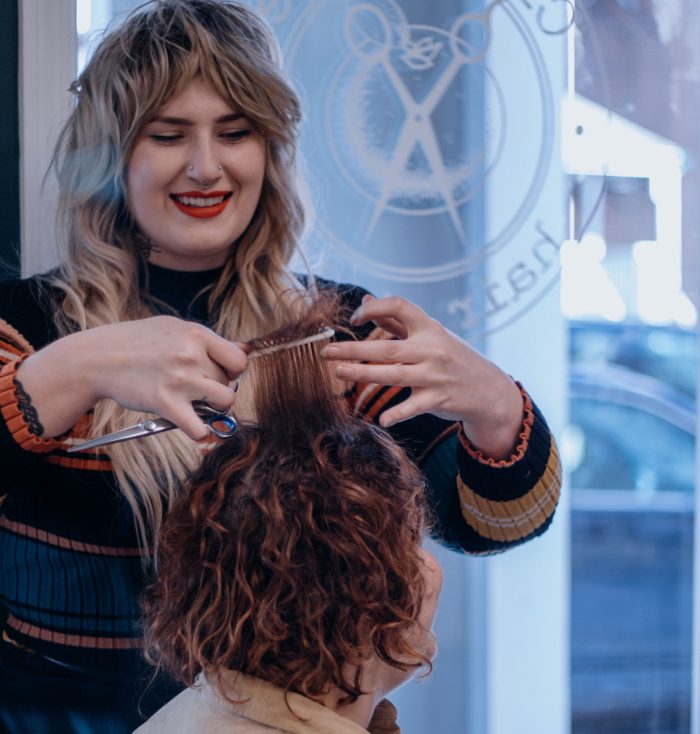The past year has been challenging, but for some, they have seen radical change
(Somerville Wire) – With approximately 68% of Somerville fully vaccinated, according to the city government’s dashboard, many hair salons are beginning to return to something close to a sense of normalcy. The City is even seeing new spaces open up, like Always Beautiful by Evelyn, a salon and spa on Highland Avenue. Owner Evelyn Estrada, an immigrant from Guatemala, said that opening her space during a pandemic, which she did on June 12, has come with challenges, but that she felt this was a necessary move.
“I come from Guatemala … and I had a salon too, before. So I never worked for somebody else. When I came here to live, it was very hard for me to work for somebody else. … Now, I want to work for myself,” said Estrada. At her former job in the United States, she said, there were financial constraints. “I like independence, and I love my job. I love to do hair. When I was little, this was my dream.”
Estrada said that business has been slow but that she has seen some of her past clients at her new salon. She hopes to employ more staff, as she is currently alone, with four chairs and an area for nails. Paying the rent and bills has been difficult, but she said that it has been important for her to follow her passion, while also supporting the immigrant community in Somerville—she speaks English, Spanish, and Portuguese.
Other salons, like Clementine Hair Studio, closed down temporarily last year and have since been seeing a steady influx of customers. Some are coming out of lockdown for the first time and are looking to cut “a lot of inches off,” according to owner Toni Lopresti. There has been a nice energy, she said, with customers making creative requests, such as “funky colors and cuts,” modern shags and mullets, “specific, queer styles,” curls, and balayage. When Clementine initially reopened, there was a sense of nervousness among staff, said Lopresti, who felt that returning was like “an experiment”—they did not know if someone would get sick or what was to come. The hair industry, in particular, has faced some unique trials.
“None of this is easy for anybody, but I think that being the industry that was chosen or forced to go back to work first, that was a challenge in and of itself, to be the test subjects on what protocols were working and what we all had to do and follow suit,” said Lopresti. “One of the biggest impacts was the emotional effect. We interact with humans every day. Human emotions are really an intense subject. … One [struggle] was the trust factor. It is a touch business, and we can’t physically perform our job at a six-foot distance from our clients. Some of the worry was, are people going to be comfortable with that?”
Some stylists, like Patrick Trant of Somerville Hair Co., have experienced radical changes in their careers during the time of the virus. After having worked in Boston for about six pandemic months, he decided to come back to Somerville, because business in Boston was not predictable. He worked at Hair at Little Hollow briefly, then decided to take control of his business as an independent stylist. He moved to Marilyn James Health and Beauty, where he rents a chair, in November 2020, and he is currently searching for his own space, where he would have control over the aesthetic and culture of the salon. His schedule is not what it was before the pandemic, but that has been his choice, he wrote in an email. His vision of the salon he would open on his own draws from his experiences at other establishments.
“I appreciate every salon and coworker I’ve worked with; some were far better than others. But all of them taught me so much. I’ve heard a few salon owners say that the drive comes from trying to be a better owner or have better salon than wherever they worked before,” wrote Trant. “I don’t want that. I want to create a salon that takes the best parts from everywhere I’ve worked and leave the rest.”
Lopresti said that the pandemic has led many individuals to reconsider what it means to be working in the hair business.
“In general, as an industry, I think it made people reassess what they want work to look like. I think people are respecting our industry a lot and all the stuff that’s involved,” said Lopresti. “A lot of businesses shut down. I think a lot of humans, or owners, or stylists just decided that it’s a lot of pressure to work on humans in a creative field and be artistically fulfilled, as well as perform customer service. There was a lot of pivoting. There were a lot of people who were like, ‘I need to open my own salon, or I need to close down.’ It’s a lot of overhead. It’s a big, big numbers game. If you can’t keep up with that, if you can’t make a profit, rents are so high. … If you don’t have scissors in your hand, you’re not making money.”
All Somerville Wire articles may be republished by community news outlets free of charge with permission and by larger commercial news outlets for a fee. Republication requests and all other inquiries should be directed to somervillewire@binjonline.org.
SUBSCRIBE TO THE FREE SOMERVILLE WIRE EMAIL NEWSLETTER: https://eepurl.com/hpBYPv
Shira Laucharoen is assistant director of the Boston Institute for Nonprofit Journalism and assistant editor and staff reporter of the Somerville Wire.





